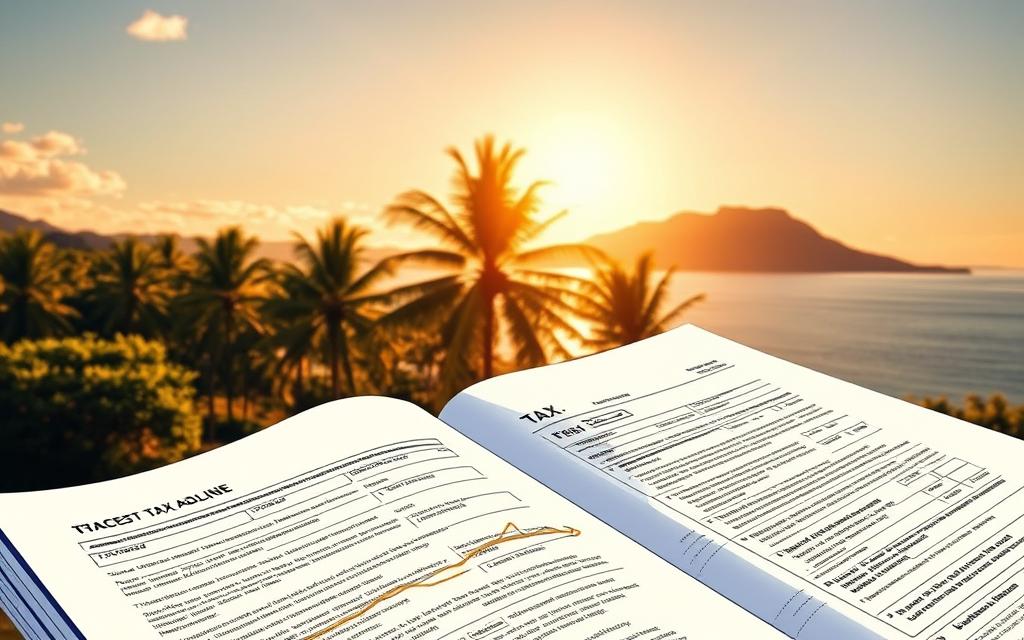Can I Be a Tax Resident in CR Without Living There Full-Time?

Did you know that over 50,000 expats call Costa Rica home? This tropical paradise attracts people with its stunning beaches, lush rainforests, and welcoming culture. But beyond its natural beauty, Costa Rica offers unique opportunities for those exploring part-time residency and tax benefits.
Many families and individuals are drawn to the country’s mild climate and enhanced quality of life. Understanding the tax system is crucial for those considering a move. The 183-day rule plays a key role in determining tax residency, even for those not living there full-time.
Exploring income tax and residency requirements can open doors to financial advantages. Whether you’re planning a short stay or a long-term move, knowing the rules ensures a smooth transition. Let’s dive into the details to help you make informed decisions.
Understanding Residency in Costa Rica

Costa Rica’s allure lies in its breathtaking landscapes and vibrant culture. From pristine beaches to lush rainforests, the country offers a lifestyle that blends tranquility with adventure. Its warm climate and affordable cost of living make it a top choice for families and individuals seeking a better quality of life.
Many are drawn to the welcoming atmosphere and the opportunity to live in harmony with nature. The country’s diverse tax system and residency rules further enhance its appeal. Understanding these regulations is essential for those planning to make the move.
Families often relocate to enjoy a safer environment and access to excellent healthcare and education. Individuals are attracted by the chance to live in a place where work-life balance is achievable. Costa Rica’s residency options complement these lifestyle benefits, making it an ideal destination for expats.
Whether you’re considering a short stay or a long-term move, knowing the annual residency requirements is crucial. This knowledge ensures a smooth transition and helps you make the most of what the country has to offer.
Exploring Different Residency Options in Costa Rica
Costa Rica offers a range of residency options tailored to diverse financial and lifestyle needs. Whether you’re seeking temporary or permanent status, the country’s system provides flexibility for individuals with varying goals. Understanding these categories can help expats make informed decisions about their move.
Rentista, Investment, and Permanent Residency Explained
The Rentista program is ideal for those with a steady income. It requires a $60,000 bank deposit and monthly transfers of $2,500 for two years. This option is popular among expats who don’t rely on employment income.
Investment residency, on the other hand, demands a minimum of $150,000 in real estate or stocks. This pathway appeals to those looking to contribute to the local economy while securing their status.
Permanent residency offers long-term security. It’s available after holding a temporary permit for at least three years. This option is perfect for expats planning to settle in Costa Rica indefinitely.
Advantages of Each Residency Category
Rentista residency provides easier entry requirements, making it accessible for many. It’s a great choice for those who want to enjoy the country’s benefits without a significant upfront investment.
Investment residency opens doors to property ownership and financial planning opportunities. It’s a strategic option for expats looking to grow their assets while living in Costa Rica.
Permanent residency ensures stability and access to the country’s social security system. It’s ideal for those committed to making Costa Rica their long-term home.
Each category has unique tax rates and benefits, so it’s essential to choose the one that aligns with your financial and lifestyle goals. For more details, explore investor residency vs permanent residency in Costa.
Navigating the 183-Day Rule for Tax Residency
Understanding the 183-day rule is essential for navigating Costa Rica’s tax system. This rule determines fiscal obligations for individuals spending significant time in the country. Even part-year residents must comply with this requirement to avoid complications.
How the 183-Day Rule Works in Practice
The 183-day rule counts any part of a day spent in Costa Rica toward the threshold. Days do not need to be consecutive, making it easier for frequent travelers to meet the requirement. This aggregation ensures clarity for individuals managing their tax status.
For example, a weekend trip or a short business visit counts as one day. This flexibility benefits those who split their time between countries. It’s crucial to track your presence accurately to meet the rule’s conditions.
Documentation and Proof of Presence
Proving physical presence requires specific documentation. Migration records, flight itineraries, and stamped passports are commonly used. These documents serve as evidence for the tax authorities.
Maintaining a detailed travel log can simplify the process. Include dates, locations, and purpose of visits. This practice ensures compliance and minimizes potential disputes.
Understanding the distinction between official residency and fiscal residency is also important. While official residency grants legal status, fiscal residency focuses on tax obligations. Both are interconnected but serve different purposes.
By following these guidelines, individuals can navigate the 183-day rule effectively. Proper documentation and accurate record-keeping are key to meeting the requirement and enjoying the benefits of Costa Rica’s tax system.
Can I be a tax resident in Costa Rica without living there full-time?

Many people wonder how Costa Rica’s tax system accommodates part-time residents. The 183-day rule plays a significant role in determining fiscal obligations. Even those who spend less than a full year in the country may qualify for tax residency under this regulation.
Partial-year residents often have questions about their status. For example, does a short visit count toward the 183-day threshold? The answer is yes. Any part of a day spent in the country is included, making it easier for frequent travelers to meet the requirement.
Interpreting the Rule for Partial-Year Residents
Costa Rican law supports various residency lifestyles. Individuals who spend significant but non-continuous periods in the country may still trigger local tax obligations. This flexibility allows expats to enjoy the benefits of residency without committing to full-time living.
Under what circumstances must partial-year residents file taxes? If the 183-day threshold is met, individuals are required to report their income. This includes both local and global earnings, depending on the specifics of the law.
Social security considerations also come into play. Meeting the 183-day rule may impact eligibility for certain benefits. It’s essential to understand these implications to make informed decisions about residency and tax planning.
For those navigating this process, proper documentation is key. Migration records, flight itineraries, and stamped passports serve as proof of presence. Maintaining accurate records ensures compliance and simplifies the filing process.
To learn more about residency requirements, explore Costa Rica residency rules and regulations.
Tax Implications for Expats: Worldwide Income vs. Costa Rican-Sourced Income

Costa Rica’s tax system offers unique benefits for expats managing income from multiple sources. Understanding the distinction between worldwide and locally sourced income is crucial. This knowledge helps expats comply with local tax law while optimizing their financial strategies.
Understanding Tax Rates and Liability
Expats who become resident Costa Rica must navigate specific tax rates and liabilities. Costa Rican tax law focuses on income earned within its borders. However, global income may also be subject to taxation under certain conditions.
For example, rental income from properties abroad is treated differently than local earnings. Experts recommend consulting a tax professional to clarify these distinctions. Proper planning ensures compliance and minimizes financial risks.
How Global Income is Treated Under Costa Rican Law
Income from a foreign source may still be subject to local taxes if it meets specific criteria. Expats earning globally must understand how Costa Rican tax law applies to their situation. This includes reporting requirements and potential exemptions.
Successful tax planning often involves combining local compliance with international strategies. For instance, dual-income expats can benefit from expert advice to optimize their tax obligations. Examples include leveraging foreign tax credits or exclusions.
By staying informed and proactive, expats can navigate Costa Rica’s tax system effectively. This approach ensures financial stability and compliance with local regulations.
Understanding Costa Rica Tax Forms and Filing Requirements
Navigating tax forms and filing requirements in Costa Rica is simpler than many expats expect. The country’s streamlined system ensures that both residents and non-residents can manage their obligations efficiently. This section breaks down the essentials to help you stay compliant.
Income Tax Return and Withholding Essentials
The primary tax form used in Costa Rica is the “Declaración de Impuesto sobre la Renta.” This form is required for reporting income earned within the country. Expats with income from outside Costa Rica may also need to file, depending on their residency status.
Withholding practices vary based on employment type. For salaried employees, taxes are typically deducted at the source. Self-employed individuals, however, must manage their own withholdings. Understanding these differences is crucial for accurate filing.
Keeping organized records is a key part of the process. Maintain detailed documentation of income, expenses, and any withholdings. This practice not only simplifies filing but also ensures compliance with local regulations.
One of the benefits of Costa Rica’s tax system is its straightforward structure. While challenges may arise, such as navigating dual-income scenarios, the process is designed to be accessible. For more insights, explore the advantages of Costa Rica residency.
Maintaining Compliance in a Diverse Tax System
Staying compliant in Costa Rica’s diverse tax system requires careful planning and organization. Expats must navigate various rules and regulations to ensure they meet all legal obligations. Proper record-keeping is essential for avoiding disputes and maintaining financial security.
Record-Keeping Best Practices for Expats
Detailed record-keeping is crucial in a complex tax system. Expats should organize receipts, travel logs, and financial documents systematically. This practice ensures accuracy and simplifies the filing process.
Digital solutions are increasingly popular for managing tax records. Software tools can help track income, expenses, and deadlines efficiently. These tools provide an added layer of security for sensitive information.
Maintaining both physical and electronic records offers flexibility. Physical copies serve as backups, while digital files allow for easy access and sharing. Periodic reviews of personal tax documentation help identify any discrepancies early.
For those earning income outside Costa Rica, proper documentation is even more critical. Keeping track of foreign earnings and expenses ensures compliance with local and international tax laws. This approach minimizes risks and enhances financial stability.
By following these best practices, expats can navigate Costa Rica’s tax system with confidence. Staying organized and proactive ensures a smooth experience and peace of mind.
Comparing Costa Rican and U.S. Tax Systems for Expats
Navigating tax systems across borders can be complex, especially for expats managing dual obligations. Understanding the differences between Costa Rican and U.S. tax practices is essential for compliance and financial planning. From tax rates to filing deadlines, each system has unique requirements that impact expats differently.
Foreign Tax Credits and the FEIE Benefit
One key advantage for U.S. expats in Costa Rica is the Foreign Earned Income Exclusion (FEIE). This benefit allows individuals to exclude up to $112,000 of foreign-earned income from U.S. taxes. Additionally, foreign tax credits can offset double taxation, ensuring expats aren’t taxed twice on the same income.
Costa Rican tax laws, however, focus primarily on income earned within the country. Expats earning globally may still need to report worldwide income, depending on their residency status. Proper planning with these benefits can optimize financial outcomes.
Key Differences in Filing Deadlines and Requirements
Filing deadlines vary significantly between the two systems. In Costa Rica, tax returns are typically due by March 15th, earlier than the U.S. deadline of April 15th. This difference requires expats to stay organized and proactive in their tax planning.
Another distinction lies in the forms used. Costa Rica’s primary tax form, the “Declaración de Impuesto sobre la Renta,” is simpler compared to the U.S. tax return. However, expats must ensure they meet both systems’ requirements to avoid penalties.
Understanding these differences helps expats manage their obligations effectively. For more insights, explore the tax implications for digital nomads living in Costa.
Leveraging Expert Guidance for Residency and Tax Planning
Navigating residency and tax planning in Costa Rica can be complex, but expert guidance simplifies the process. Whether you’re managing income from multiple sources or exploring residency options, professional advice ensures compliance and financial optimization.
Understanding the nuances of Costa Rican tax law and residency requirements can be challenging. Consulting experienced advisors helps avoid costly mistakes and ensures a smooth transition. Professionals provide tailored solutions that align with your financial and lifestyle goals.
When to Consult Tax and Legal Professionals
Seeking expert advice is crucial when dealing with dual-income scenarios or complex tax filings. Professionals can clarify how Costa Rican tax law applies to your situation, especially if you earn income globally. They also help navigate the 183-day rule and other residency requirements.
Experienced advisors add significant value by identifying potential risks and opportunities. For example, they can guide you on how to optimize foreign tax credits or exclusions. Their expertise ensures compliance with both local and international regulations.
Typical scenarios where expert consultation is beneficial include managing rental income, filing annual returns, or planning long-term residency. Professionals can also assist with documentation, ensuring accurate record-keeping for tax purposes.
Resources for expats include local tax firms, online platforms, and legal advisors specializing in Costa Rican law. These experts provide personalized support, making the process less daunting. Viewing professional guidance as an integral part of your planning ensures long-term success.
For more information on residency options, explore how to get residency in Costa. Expert advice is your key to navigating the complexities of tax and residency planning effectively.
Conclusion
Understanding Costa Rica’s tax system can unlock financial opportunities for expats. The 183-day rule plays a key role in determining fiscal obligations, even for those not living there full-time. Proper documentation and accurate record-keeping are essential to meet these requirements.
Diverse residency options cater to various lifestyles, from temporary stays to permanent relocation. Managing worldwide income and local taxation requires careful planning to ensure compliance and optimize financial outcomes. Expats must file returns based on their residency status and income sources.
Professional guidance is invaluable for navigating this complex system. Consulting experts ensures compliance with local regulations and helps expats make informed decisions. By understanding the rules and planning accordingly, individuals can enjoy a better quality of life in Costa Rica.


